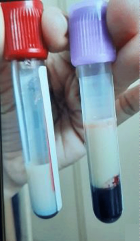About Augusta University
Augusta University
Articles by Augusta University
Membranous nephropathy complicating relapsing polychondritis: A case report
Published on: 7th October, 2021
OCLC Number/Unique Identifier: 9305467462
Background: Relapsing polychondritis is a rare systemic disease characterized by recurrent inflammation, and often destruction, of cartilaginous tissues. Renal manifestations are rare. Membranous nephropathy complicating relapsing polychondritis has been reported only once previously, and there is no standardized treatment for membranous nephropathy associated with relapsing polychondritis.Case presentation: A 67-year-old Caucasian man with a history of chronic renal disease presented with 9 months of progressive dyspnea on exertion and 5 months of erythema, pain, and collapse of auricular cartilage. Imaging studies confirmed active inflammation of laryngeal, auricular, and costal cartilage and he was diagnosed with relapsing polychondritis. Patient had longstanding proteinuria and renal biopsy demonstrated membranous nephropathy. Patient initially showed renal and respiratory improvement with etanercept, a tumor necrosis factor alpha inhibitor, treatment. However, subsequent disease and treatment-related complications led to a progressive overall clinical decline and patient died approximately 1 year following relapsing polychondritis diagnosis.Conclusion: Membranous nephropathy may rarely complicate relapsing polychondritis. In our case, both the cartilaginous inflammation and the renal disease improved after treatment with tumor necrosis factor alpha blockade, however complications of existing airway disease led to recurrent hospitalizations and eventually death.
Is COVID-19 a Risk Factor for Hypertensive Disorders of Pregnancy?
Published on: 11th September, 2023
Objective: This study aims to assess whether COVID-19 infection during pregnancy is a risk factor for hypertensive disorders of pregnancy, including gestational hypertension, preeclampsia, HELLP (hemolysis, elevated liver enzymes, and low platelets) syndrome, and eclampsia. Methods: A retrospective evaluation was conducted on obstetric patients who gave birth between March 2020 and December 2021 at Augusta University Medical Center, an academic urban referral center in Augusta, GA. The patients were categorized into two groups: those who were COVID-19 positive during pregnancy and those who were COVID-19 negative. The primary outcome was the development of a hypertensive disorder of pregnancy. Secondary outcomes included preterm delivery, mode of delivery, maternal death, maternal ICU admission, NICU admission, intrauterine fetal demise/stillbirth, fetal growth restriction, and prolonged hospital stay. The association between COVID-19 status and categorical outcomes was assessed using Chi-squared and Fisher’s exact tests. Mean differences between groups were evaluated using Student’s two-sample tests. Additionally, a multinomial multiple logistic regression was performed to assess whether COVID-19 is a risk factor for hypertensive disorders of pregnancy when adjusting for potential confounding effects. Results: Out of the 2760 charts reviewed, 2426 (87.9%) met the inclusion criteria. Of those 2426 patients, 203 were COVID-positive and 2223 were COVID-negative . There were no significant differences in patient sociodemographic information between the COVID-19 positive and negative groups. After adjusting for potential confounding effects, COVID-19 was determined to be a risk factor for combined hypertensive disorders of pregnancy (OR 1.93, 95% CI 1.39-2.66) and preeclampsia specifically (OR 2.01, 95% CI 1.38-2.88).For the observed secondary outcomes, COVID-19 infection during pregnancy was associated with an increased risk of cesarean delivery (p = 0.046), maternal ICU admission (p = 0.008), and prolonged hospital stay (p < 0.001).Conclusion: The findings of this study suggest that COVID-19 infection during pregnancy is linked to an increased risk of developing preeclampsia. COVID-19 was not a statistically significant risk factor for gestational hypertension when controlling for confounding effects. The study was unable to draw conclusions about more severe hypertensive conditions of pregnancy (HELLP, Eclampsia), likely due to their low prevalence in the study sample. COVID-19 was shown to be a risk factor for cesarean delivery, prolonged hospital stay, and maternal ICU admission in secondary outcome analysis. This research contributes to existing knowledge by examining the association between COVID-19 and hypertensive disorders of pregnancy during a period encompassing multiple strains of the COVID-19 virus.

HSPI: We're glad you're here. Please click "create a new Query" if you are a new visitor to our website and need further information from us.
If you are already a member of our network and need to keep track of any developments regarding a question you have already submitted, click "take me to my Query."

























































































































































